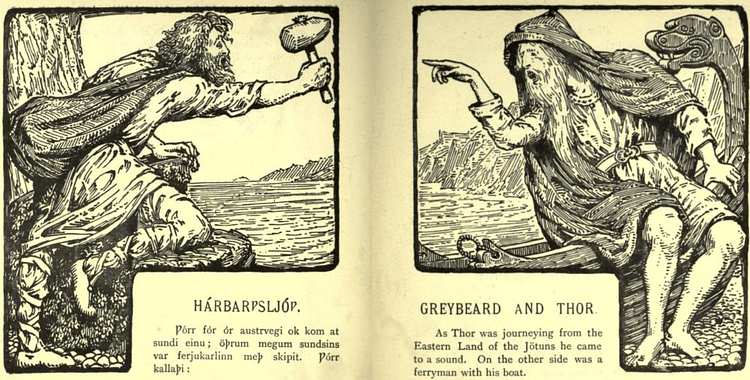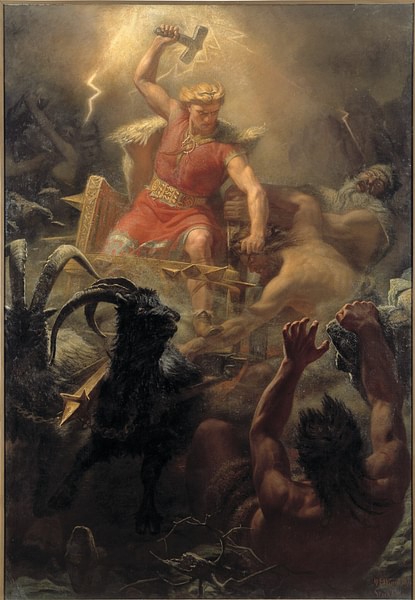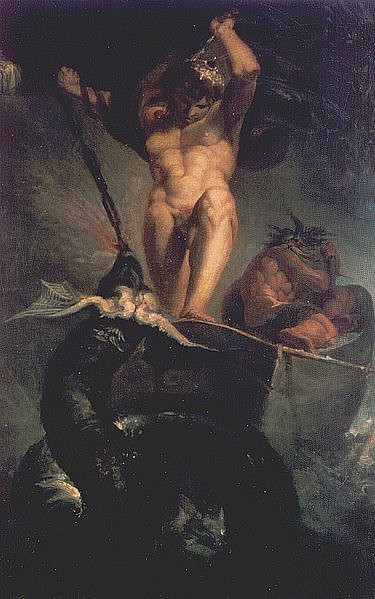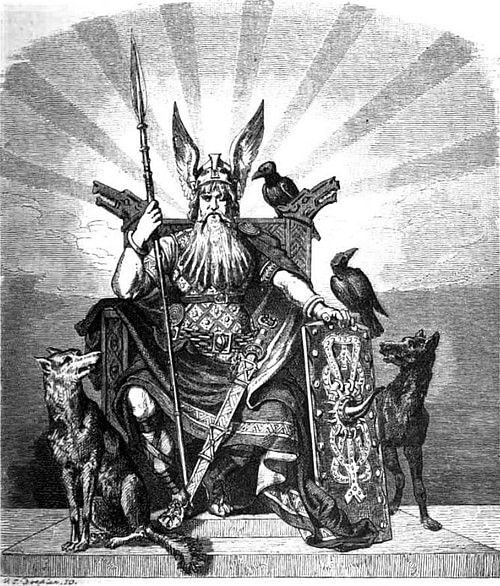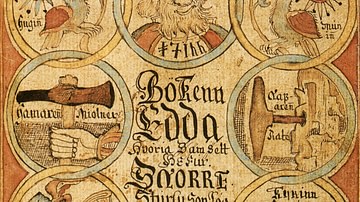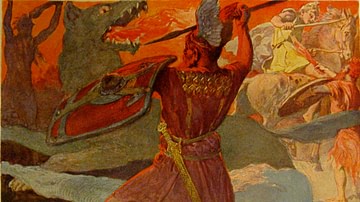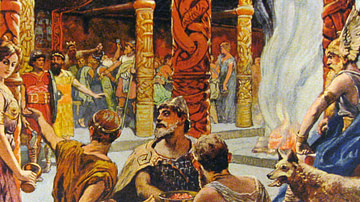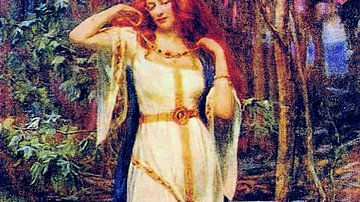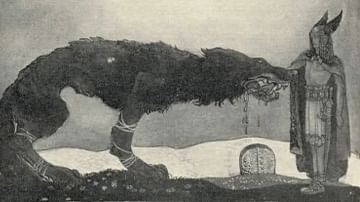The poem called The Lay of Greybeard (Old Norse: Hárbarðsljóð) is one story from Norse mythology that relates an intriguing verbal fight between two of its essential gods, Thor and Odin. The poem consists of 60 stanzas and is found complete in the 13th-century CE manuscript Codex Regius that contains the Poetic Edda, the most important source of Viking myth. It differs from the other poems because the metric forms are not as rigid, and some parts of the speeches are even simple prose. It deals with Thor coming back from one of his adventures and wanting to cross a fjord. He approaches a ferryman by the name of Harbard, who is actually Odin in disguise, who refuses to carry him across. Then they start asking questions about each other and exchanging information about their great deeds while adding insult to injury. The poem might even have been set as a stage play since the names of the characters are written next to the lines in the manuscript.
A Game of Wits
They verbally duel in a so-called mannjafnaðr, a comparison of men, both trying their superiority. The poem differs in tone from the others in the Poetic Edda; with its colloquial nature, it seems more like a farce than anything to be taken seriously. We might not need to look for deeper meanings in this poem, as its simple amusing vulgarity is sure to have entertained the audience of medieval literature.
In the story, Thor comes back from what might have been an important journey, probably an encounter with a giant, and requests to be ferried over in exchange for food, but the ferryman not only refuses but also tells him that his mother (Jorð, the earth) is dead and goes on to belittle him stating he does not even have storehouses or proper clothes, thus he is no worthy peasant - which was an essential role in the Middle Ages. Odin says he was assigned to only carry over worthy men, which Thor apparently is not. Thor, in an act of courage, since he was still on enemy ground, reveals his identity as "the strong one among the gods" (Hildebrand, 173) while Odin lies and gives him his other name, Harbard (Hárbarþr), boasting that he would seldom hide his name. The greatest lie indeed. He continues with the insult that he would hide and defend himself from people like Thor.
As expected, Thor gets really mad and threatens him, with Odin replying that it would be hard since he is his fiercest enemy since the giant Hrungnir. Thor probably found this funny since he is the one who shattered his head and wonders in stanza 15, "what were you doing in the meantime" (Hildebrand, 175), a recurring line in the poem. Odin boasts he was waging war and seducing girls, something Thor is curious about and not only in this story. He appears to have been very charming indeed, sleeping with no fewer than seven sisters.
What could Thor boast about next? Obviously more dead giants, this time Thjazi. He is the one who kidnapped the goddess Idun, keeper of the golden apples of youth. He says he killed him and made stars out of his eyes. This detail parallels a story told in the Prose Edda, the version of Norse mythology comprised by Snorri Sturluson. Here Thor, after battling the stone giant Hrungnir, has a whetstone stuck in his head. A witch named Groa sings some charms to loosen it, and Thor wants to reward her. He tells her on his way back from Jotunheim, the land of the giants, as he carried her husband in a basket across the rivers, one of his toes froze. He then cast the toe into the skies, and it became a star, a sign he would soon be home. This must have been part of a larger, now lost reference. Either way, the name of the husband’s witch is Aurvandil, corresponding to the English earendel, dawn. This act of throwing Thjazi’s eyes and Aurvandil’s toe into the heavens is perhaps the only indication of Thor’s contribution to the cosmic order. He is rather the one keeping it, not setting it into place.
Thor regards the slaying of Idun’s kidnapper as his mightiest deed since every god can see the result: they no longer grow old. Odin replies by saying something about a mysterious adventure with several witches. He received a wand that he then used to steal the owner’s mind, a deed that Thor condemns in stanza 21, saying that "you repay good gifts with evil mind" (Hildebrand, 178). As we can see the popular stereotype of Odin as the old wise man is far away from his original complex image. Moreover, he cynically declares in the next stanza that "the oak must have what space it takes from the other" (Hildebrand, 178). He gives pragmatic egocentric advice much like everywhere else in the poems.
Once again Thor mentions his killing of giants, without which Midgard would truly be in danger or even destroyed. In Odin’s next reply, again, we have no trace of the wise old man: "I raised wars, angered princes, never have I brought peace" (Hildebrand, 179). He then proceeds to irreverently accuse his son of cowardice, reminding us of another of Thor's journeys, when he found himself in the glove of the giant Fjalar/Skrýmnir, which he thought to be a house.
In the Prose Edda, Thor, at some point, travels with Loki and a slave boy to the realm of the giant Útgarda-Loki. On their trip, they spend the night in a hall which proves to be the glove of this huge character Skrýmnir, who then joins them for a while. After they part ways, the group reaches Útgarda-Loki’s hall, where the giant challenges them to a series of contests. Thor cannot drink a whole drinking horn despite three huge gulps, because that is the sea; he cannot lift the giant’s cat from the ground because that is Jörmungandr, the serpent surrounding the earth; and he cannot fight an old woman who is actually a personification of old age. The next morning Útgarda-Loki admits he is in fact Skrýmnir and used spells to deceive him and his companions. As Thor raises his hammer, the giant’s hall disappears. Just like Odin, he manages to outwit Thor who seems rather slow-minded and cannot grasp the deeper meanings of what is going on around him. He does win these contests, which is why he gets enraged in Hárbarðsljóð by his father's comments.
Thor mentions his success in battle and insults Odin by calling him probably the worst possible thing you could have been called in the Viking world: ragr, or 'womanish'. The Allfather, on the contrary, tries to point out his manliness by mentioning an affair with a fair lady, which catches Thor's attention. Odin would have liked him to be there to hold her down but says he does not know if he could have trusted him. No moral dilemma about the deed itself, however.
After Thor mentions his super giant-slaying abilities once more, Harbard/Greybeard slanders him: "shame is what you won, Thor, because women you slew" (Hildebrand, 182). They were not really women though, more like wolf-monsters or brides of berserkers, in the words of Thor. In an odd twist of events, Odin boasts of having come with an army close to Asgard to redden his famous spear, therefore challenging the gods themselves, but it is not known which expedition he is referring to.
In an apparent attempt at bribery, however, he offers Thor an arm ring not to mind him, causing him to angrily reply that never has he ever heard such impudent speech. Odin then alludes to his necromancer skills, admitting he had learnt these skills from the dead. Then he tells Thor to go fight his wife’s lover at home rather than threaten him with the hammer: "never have I thought that Asathor would be stopped from his journey by a ferryman" (Hildebrand, 186). Just like Odin, Thor goes by various names in the poems, Asathor simply meaning Thor of the gods, the godly Thor. Thus Odin refuses him passage to Asgard. However, he does give him some indications on how to get home, and Thor is happy to get rid of all his mockery. As expected, the god in disguise does not bid him farewell but says "go where everything bad will get you!”
Significance of the Story
In this game of wits, Odin clearly emerges as the winner, since Thor is not able to force Greybeard to get him over the fjord. As in other Norse sources such as the Völsunga saga, while he indeed might be considered shrewd, witty, and knowledgeable, Odin is also pragmatic, selfish, arrogant, and even cruel. In this 13th-century CE legendary saga about the clan of the Völsungs to which the hero Sigurd/Siegfried the dragon-slayer belongs, Odin will break Sigmund’s (Sigurd’s father) sword, allowing him to fall to his enemies. He does this despite the fact that he is the one who offered Sigmund the sword. Odin is in no way driven by some moral force or inherent goodness; it would be very strange to think of the Norse gods in such terms.
Unlike the more popular Thor, who protects the world, Odin's characteristics fit more those of kings and noblemen. In the Hárbarðsljóð, Thor is the more good-natured one, and Odin is the versatile tricky one, which can also be seen in the things they tell each other. Odin not only has warrior skills, but he also uses his magic to submit people to his will. Odin’s intellectual superiority over his son is also obvious in other poems, such as the Grímnismál and the Vafþrudnismál from the Poetic Edda.
In the former, Odin calling himself the Masked One (Grimnir) arrives at the court of king Geirröd who puts Grimnir in the fire after hearing about his magical skills. After the king’s son offers him a drink, he starts having a series of visions about the dwellings of the gods, life in Valhalla, and different natural elements. He also lists a series of names he is called, followed by the revelation that he is Odin. King Geirröd rushes to liberate him from the fire but falls on his sword, at which point Odin disappears.
In the latter, Odin visits the wisest of giants, Vafþrúðnir, and they have a long dialogue where they ask each other questions of mythological nature. After the four questions answered correctly by Odin, he asks the giant 18 difficult questions of which he only answers 17. This is because the last one reveals Odin’s true identity: he asks what the god spoke at the funeral of his son Baldr. While the story of Baldr’s funeral does not include Odin's message, the motif is used to indicate his extensive knowledge. He knows all that can be known. The Lay of Greybeard, similarly to these other two poems, dwells on the idea of Odin’s mental and verbal power to win his battles. Thor, on the other hand, represents material, physical strength.
